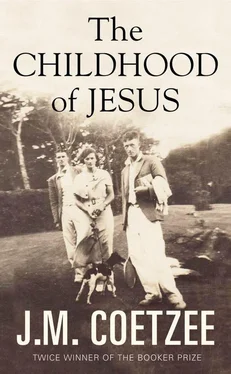‘ You mustn’t fight,’ says the boy.
‘I won’t, I promise you.’
‘You must never fight.’
‘I am not in the habit of fighting. And Álvaro wasn’t fighting. He was just trying to protect himself. He tried to protect himself and he got cut.’ He stretches out his hand, to show how Álvaro tried to protect himself, how Álvaro suffered the cut.
‘Álvaro was fighting,’ says the boy, pronouncing the words with solemn finality.
‘Protecting yourself isn’t fighting. Protecting yourself is a natural instinct. If someone tried to hit you, you would protect yourself. You wouldn’t think twice. Look.’
In all their time together he has never laid a finger on the boy. Now, suddenly, he raises a threatening hand. The boy does not bat an eyelid. He feints a slap to his cheek. He does not flinch.
‘All right,’ he says. ‘I believe you.’ He lets his hand drop. ‘You are right, I was wrong. Álvaro should not have tried to protect himself. He should have been like you. He should have been brave. Now shall we stroll over to the clinic and see how he is getting on?’
Álvaro comes to work the next day with the injured hand in a sling. He refuses to discuss the incident. Taking their lead from him, the men too do not talk about it. But the boy keeps nagging. ‘Is señor Daga going to bring the bicycle back?’ he asks. ‘Why is he called señor Daga?’
‘No, he won’t be coming back,’ he replies. ‘He doesn’t like us, he doesn’t enjoy the kind of work we do, he has no reason to come back. I don’t know if Daga is his real name. It doesn’t matter. Names don’t matter. If he wants to call himself Daga, then let him.’
‘But why did he steal the money?’
‘He didn’t steal the money. He didn’t steal the bicycle. Stealing means taking what doesn’t belong to you while no one is looking. We were all looking while he took the money. We could have stopped him, but we didn’t. We chose not to fight with him. We chose to let him go. Surely you approve. You are the one who says we shouldn’t fight.’
‘The man should have given him more money.’
‘The paymaster? The paymaster should have given him whatever he wanted?’
The boy nods.
‘He couldn’t do that. If the paymaster paid each of us whatever we wanted, he would run out of money.’
‘Why?’
‘Why? Because we all want more than is due to us. That’s human nature. Because we all want more than we are worth.’
‘What is human nature?’
‘It means the way human beings are built, you and I and Álvaro and señor Daga and everyone else. It means the way we are when we come into the world. It means what we all have in common. We like to believe we are special, my boy, each of us. But, strictly speaking, that cannot be so. If we were all special, there would be no specialness left. Yet we continue to believe in ourselves. We go down into the ship’s hold, into the heat and dust, we heave sacks onto our backs and lug them up into the light, we see our friends toiling just like us, doing exactly the same work, nothing special about it, and we feel proud of them and of ourselves, all comrades labouring together with a common goal; yet in a little corner of our hearts, which we keep hidden, we whisper to ourselves, Nevertheless, nevertheless, you are special, you will see! One day, when we are least expecting it, there will be a blast on Álvaro’s whistle and we will all be summoned to assemble on the quayside, where a great crowd will be waiting, and a man in a black suit with a tall hat; and the man in the black suit will call on you to step forward, saying , Behold this singular worker, in whom we are well pleased! and he will shake your hand and pin a medal on your chest — For Service Beyond the Call of Duty, the medal will say — and everyone will cheer and clap.
‘It is human nature to have dreams like that, even if it would be wise to keep them to ourselves. Like all of us, señor Daga thought he was special; but he didn’t keep the thought to himself. He wanted to be singled out. He wanted to be recognized.’
He halts. There is no sign on the boy’s face that he has understood a word. Is today one of his stupid days or is he just being stubborn?
‘Señor Daga wanted to be praised and given a medal,’ he says. ‘When we didn’t give him the medal he dreamed of, he took money instead. He took what he thought he was worth. That’s all.’
‘Why didn’t he get a medal?’ says the boy.
‘Because if we all got medals then medals would be worth nothing. Because medals have to be earned. Like money. You don’t get a medal just because you want one.’
‘I would give señor Daga a medal.’
‘Well, maybe we should ask you to be our paymaster. Then we will all get medals and as much money as we want and next week there will be nothing left in the moneybox.’
‘There’s always money in the moneybox,’ says the boy. ‘That’s why it is called the moneybox.’
He throws up his hands. ‘I won’t argue with you if you are going to be silly.’
Some weeks after they first presented themselves at the Centre, a letter arrives from the office of the Ministerio de Reubicación in Novilla informing him that he and his family have been allocated an apartment in the East Village, occupation to be effected no later than noon on the coming Monday.
East Village, familiarly known as the East Blocks, is an estate to the east of the parklands, a cluster of apartment blocks separated by expanses of lawn. He and the boy have already explored there, as they have explored its twin estate, West Village. The blocks making up the village are of identical pattern, four floors high. On each floor six apartments face upon a square that holds such communal amenities as a children’s playground, a paddle pool, a bicycle rack, and washing lines. East Village is generally held to be more desirable than West Village; they can count themselves lucky to be sent there.
The move from the Centre is easily effected, for they own few possessions and have made no friends. Their neighbours have been, on one side, an old man who dodders around in his dressing gown talking to himself, and on the other a stand-offish couple who pretend not to understand the Spanish he speaks.
The new apartment, on the second floor, is modest in scale and sparsely furnished: two beds, a table and chairs, a chest of drawers, steel shelving. A tiny annexe contains an electric cooker on a stand and a basin with running water. A sliding screen hides a shower and toilet.
For their first supper in the Blocks he makes the boy’s favourite food, pancakes with butter and jam. ‘We are going to like it here, aren’t we?’ he says. ‘It will be a new chapter in our life.’
Having advised Álvaro that he is not well, he has no qualms about taking days off from work. He is earning more than enough for their needs, there is little to spend his money on, he does not see why he should exhaust himself to no purpose. Besides, there are always new arrivals looking for casual work who can fill in for him at the docks. So some mornings he spends simply lazing abed, dozing and waking, enjoying the sunny warmth that pours in through the windows of their new home.
I am girding my loins , he tells himself. I am girding my loins for the next chapter in this enterprise . By the next chapter he means the quest for the boy’s mother, the quest that he does not yet know where to commence. I am concentrating my energies; I am making plans.
While he relaxes, the boy plays outdoors in the sandpit or on the swings, or else roams among the washing lines, humming to himself, winding himself like a cocoon in drying bedsheets, then gyrating and unwinding himself. It is a game he never seems to tire of.
Читать дальше












